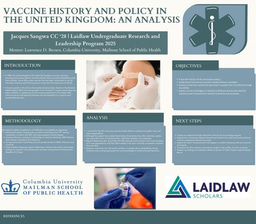Project Outline: Voluntary Vaccinations and the Methodologies that lead to high rates of vaccinations in the United Kingdom

UK Vaccination Policy: An analysis
Supervised By: Lawrence D Brown, PhD, Mailman School of Public Health, Columbia University
Project Background:
The United Kingdom (UK), specifically England's National Health Service, (NHS) is able to maintain a quarterly average of 91.8% vaccination coverage for infants at 12 months for the 6-in-1 vaccine, despite vaccines not being legally mandatory. Many countries like the United States, whose Polio vaccination rate is 92.5% for 24-month old children, use mandates to ensure vaccination rates are at a point where public safety is not at risk.
With the UK’s nontraditional route towards societal health in mind, the core of my research aspires to answer the question of how public health can thrive without government mandates and full agency of the citizen. To do this, I will study how NHS officials, nonprofit advocates, and families navigate vaccines, as well as how they work together to promote the health of the UK society. This project offers an interpretation of vaccine policy history, emphasizing how trust is essential to successful public health and how citizens and nonprofit organizations can maintain public health despite non-mandatory policy.
Objectives
I hope to narrate the role of the National Health System and nonprofits of the UK's role in establishing a culture of successful vaccination rates without impeding on the agency of its citizens. Afterwards, see how health organization's methods can be applicable to countries with weak central governments, and evaluate how health organizations and nonprofits in developing countries can increase and maintain vaccination rates.
Research Question
- How can public health thrive without government mandates and full agency of the citizen
- What methods do health organizations use to propel the public towards pro-vaccination sentiment? How can this be applied on at the developing country level?
Methodology
My methodologies include research of United Kingdom's Vaccine Policy History, conducting interviews with United Kingdom health officials, and the overall collection of data concerning vaccine culture in the UK.
To do this, I will conduct an extensive review of literature and policy documents. This includes searching for and analyzing NHS documents on vaccine history, public health strategy, and trust-building mechanisms. I will look specifically for documents and data that show how vaccines are presented to the public, how consent is achieved, and how progress is sustained. Understanding the historical and institutional frameworks that guide the NHS’s vaccine programs will be the basis of my project.
Once I have built this knowledge base, I will begin outreach and interviews with professionals such as staff of the UK embassy in New York, National Health System Officials and nonprofit organizations such as UNICEF UK. My goal is to learn how these leading groups collaborate to foster a strong culture of immunization in the UK.

Please sign in
If you are a registered user on Laidlaw Scholars Network, please sign in